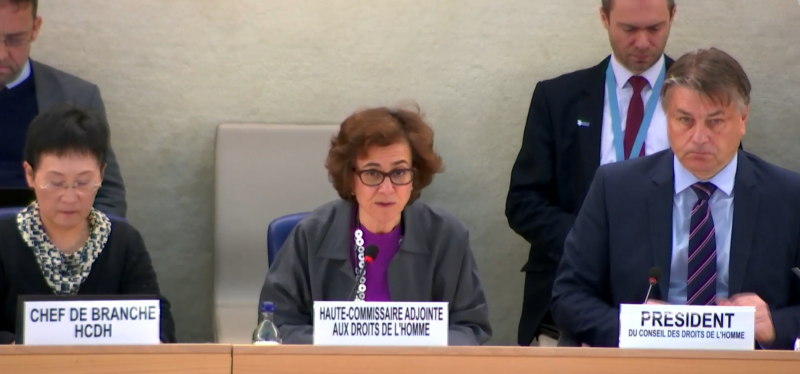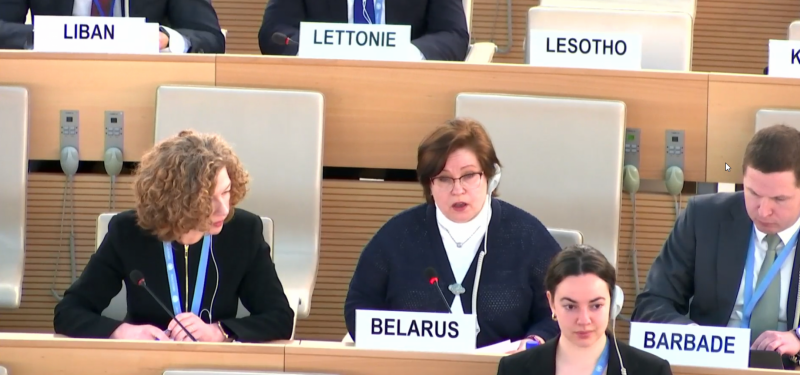Belarus outraged by the UNHCHR report on the situation with the human rights in the country
On March 22, oral statements were delivered during the interactive dialogue with OHCHR experts on Belarus at the 52nd session of the UN Human Rights Council in Geneva. Read how the report on Belarus was received by representatives of the country's delegation, interested countries, and NGOs.
UNHCHR report

- UN Deputy High Commissioner for Human Rights Nada Al-Nashif presented the report. Source: UN live translation
The Office of the United Nations High Commissioner for Human Rights has published a second report on Belarus in the run-up to the 2020 presidential election and in its aftermath on March 17. UN Deputy High Commissioner for Human Rights Nada Al-Nashif announced it on 22 March, in Geneva.
The report notes that some of the violations may also amount to crimes against humanity considering the organized and widespread nature of the violations that were intentionally directed at those who were – or were perceived to be – opposing the Government or expressing critical or independent voices.
Reaction of Belarus

- The delegation of Belarus was outraged by the report. Source: UN live translation
Following the reading of the report, the delegation of Belarus as the affected country was given the floor. Its representative invited everyone to visit Belarus and see for themselves “the peaceful and creative life of our citizens”.
“Belarus survives and develops despite the pressure and hysteria exerted by a number of Western countries and the so-called OHCHR examination. The authors of these reports and the initiators of anti-Belarus resolutions in the Human Rights Council humiliate the Belarusian people by trying to identify our entire nation with a few marginal NGOs and a couple of hundred so-called opposition members who cowardly fled the country after the failed attempt at a color revolution in 2020,” she said.
Reactions of other countries
The European Union representative stressed the Union’s deep concern about the intensifying crackdown on civil society, human rights activists, and independent media in Belarus.
“We are concerned about human rights violations in Belarus, which is involved in the Russian war against Ukraine, and we call on Belarus to put an end to human rights violations by ceasing its participation in this operation,” said a representative of the EU.
The EU was particularly concerned about cases of sexual violence against detainees, as well as the general situation of political prisoners in Belarus.
The following countries joined the EU statement and supported the extension of the mandate to investigate the situation in Belarus: Lithuania, Liechtenstein, Finland, USA, Czechia, Germany, France, Belgium, Latvia, Cyprus, Switzerland, Poland, Slovakia, Netherlands, Moldova, Austria, Spain, Albania, Greece, Malta, Montenegro, Romania, Bulgaria, Australia, Ireland, Ukraine, and Croatia.
China, Venezuela, Cuba, Tajikistan, Russia, North Korea, Laos, Iran, Nicaragua, Cambodia, Lebanon, Syria, Kazakhstan, Azerbaijan, and Zimbabwe did not support or remain neutral on the UN Human Rights Council resolution.
For example, Venezuela pointed out that the OHCHR report was done remotely.
“We condemn the politicization and interference in the internal affairs of the country and support the actions of Belarus for peace and in defense of its sovereignty,” said the representative of Venezuela.
NGO's reaction
The statements of non-governmental organizations were unanimous in their nature. Among the speakers were the International Fellowship of Reconciliation, Belarusian Helsinki Committee, Human Rights House Foundation, International Bar Association, FIDH, International Commission of Jurists, Committee against Torture, and others.
The representative of Right Livelihood stressed the conditions under which the trial of Viasna leaders, Ales Bialiatski, Valiantsin Stefanovic, and Uladzimir Labkovic, took place. He said:
“The human rights defenders were treated like the worst criminals: handcuffed, in a cage, denied pens and paper, targeted by smear campaigns by the state media and ultimately given lengthy sentences and unpayable fines.”
What is next?
The collection of proposals for the extension of the mandate on Belarus has been completed. The request for an extension must now be substantiated and communicated to the Secretariat. Extensions will only be approved by the Human Rights Council in exceptional circumstances and will only be granted once. Proposals will then be approved by the Council and registered with the Secretariat.
“We do not have political prisoners, we have people who have broken the law,” Belarus noted in a closing remark.

















